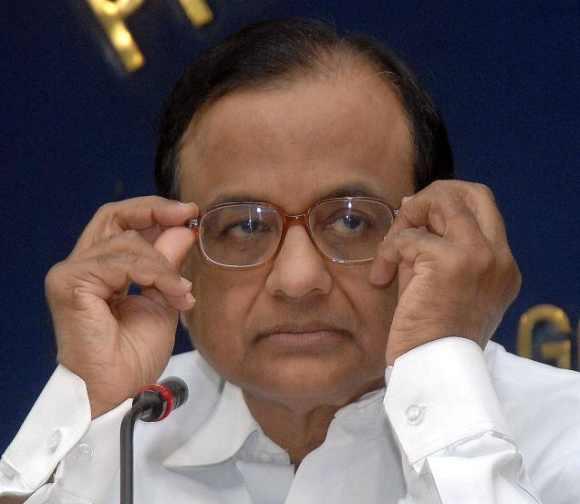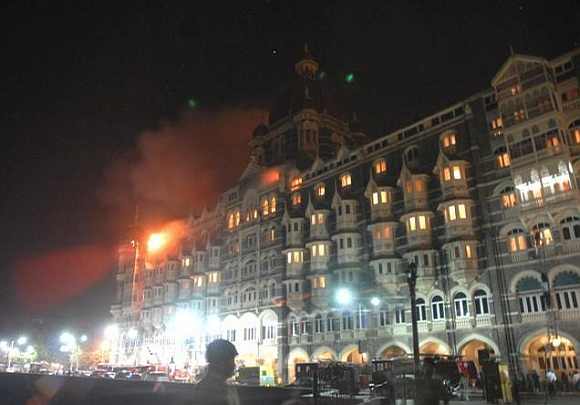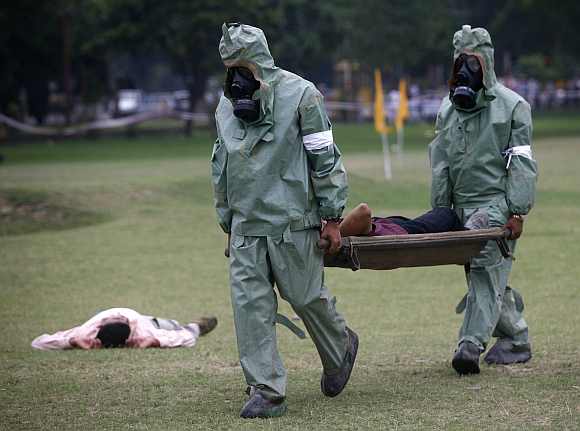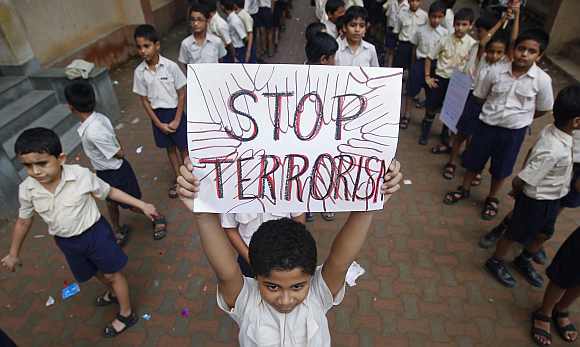
State governments must think again before opposing Home Minister P Chidambaram on the Nation Counter-Terrorism Centre, says Aditi Phadnis
For a man who has never done anything illegal in his life, Home Minister P Chidambaram must feel angry and frustrated that this charge should be levelled against him in the context of the National Counter-Terrorism Centre that he is trying to set up. Opposition-ruled states have reacted as if he's made an indecent suggestion to them.
Worse, Prime Minister Manmohan Singh has conceded that they have a point by asking Chidambaram to talk to them before operationalising the empowered NCTC. Political managers say the upcoming 2013-14 Budget might be in jeopardy if the opposition and some allies find a new controversy. The captain of the team has asked one of his team members to under-perform and ensure the team loses. That tells its own story about his captaincy and leadership. But that's another story.
What has the home minister done that's got the state governments' knickers in such a twist? Chief ministers say empowering NCTC with Section 43 (A) of the Unlawful Activities (Prevention) Act would infringe on the powers of state governments. How? Section 43 (A) says, "a person (suspect) may be arrested by any officer of the designated authority". The NCTC is going to be one such authority. State governments don't want this. They want all agencies dealing with terrorism to "follow proper channel": that is, talk to them before they make any arrests.
...
For Rediff Realtime News click here

The Ministry of Home Affairs says there is no contradiction. Section 43 (B) is very clear, "Any officer arresting a person under Section 43A shall... inform him of the grounds of arrest... Every arrested person and article seized under Section 43A shall be forwarded without unnecessary delay to the officer in charge of the nearest police station."
The police station is under the jurisdiction of the state governments that operate via the state directors general of police.
If this law is operationalised, what will NOT happen is the delay, for instance, on the part of the Maharashtra government in following up suspicious activity at sea just before November 2008. In August 2008, it is now established, boats set out to reach Mumbai presumably to carry out an "operation" from somewhere off the Karachi coast. Indian intelligence agencies had the information that there had been some suspicious movement. But the state government thought the Centre was dealing with it; the Centre thought the state was doing something about it. The net result was: the information slipped through the cracks and disappeared. That, it later turned out, was the recce.
If an NCTC had existed, satellite surveillance could have been mounted, someone could have been caught, arrested and questioned, and maybe 26/11 might have been foiled.

And 26/11 followed.
After 26/11, Parliament passed the amendments to the Unlawful Activities (Prevention) Act. No one -- not the Bharatiya Janata Party, the new defender of civil rights, not the Left parties -- found anything amiss in passing a law that expanded the period of preventive detention from 90 days to 180 days; police custody for 30 days; denial of bail if the police made out any kind of case; blanket denial of bail to foreigners; allowing police officials to arrest, search on "suspicion" anyone without the need for warrant, and seize their properties; and empowering the court that "unless the contrary is shown, it will presume the accused has committed an offence for which he has been arrested" (in other words, that a person shall be presumed to be guilty until he can prove that he is innocent). No state government, no political party objected to any of this. They actually collaborated in passing the law. One of the amendments in the UAPA was also to give the powers to a designated agency to arrest.
So now, to turn around and say that what Chidambaram is trying to do is illegal and anti-federal is just brazen in its opportunism. All he has done is notify a decision Parliament has taken. You could say -- as indeed, civil rights organisations have said -- that the law is bad. But that's not what the opposition is saying. It is saying: don't curb our powers to use it.
The danger is the distortions that creep into the system when it comes to fighting terrorism. India needs an organisation that can analyse intelligence. NCTC will be that organisation that will process information from different agencies via the National Intelligence Grid and will follow this up to its logical conclusion.

How did the US Seals get Osama bin Laden? A core team did nothing but process and analyse intelligence for 10 years, located him and took him out. Admittedly, the Intelligence Bureau is mandated with intelligence gathering. Its success must be attributed to all the attacks it has managed to foil, that we will never even know about. But if 26/11 could happen, clearly its efforts were not adequate. The structure of the IB is such that it is impossible to turn that into NCTC.
NCTC is visualised as being run by a standing council that will have representatives of anti-terrorism forces in each state on it. What it will be is a single point of control to coordinate all counter-terrorism moves.
Instead the home minister is being forced to coax, placate and cajole satraps. Many of these state governments have been -- and continue to be -- in league with those very groups that undermine the rule of law. It is to these dark corners that Chidambaram is holding the torch. Naturally, most state governments would prefer to operate in the dark.